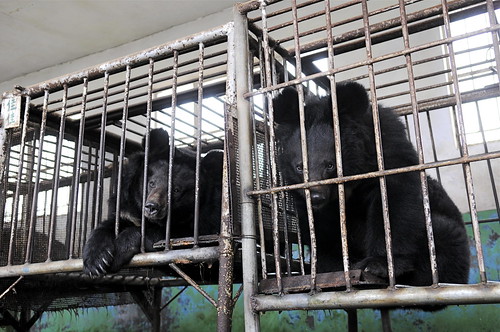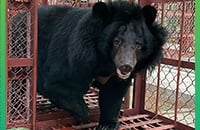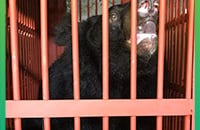Smuggled bear cubs hint at scale of illegal trade
12 August 2015

By Animals Asia Vietnam Director Tuan Bendixsen
This month Animals Asia’s Vietnam sanctuary rescued moon bear Murphy – one of the youngest bear cubs we’ve ever encountered. When he was just six weeks old, Murphy’s mother was killed by a poacher so he could be taken and sold.
Murphy is the 32nd bear cub to be raised at our sanctuary since 2008. Each one’s story mirrors Murphy’s, they were all being groomed for a lifetime as a living bile tap.
Now they require a lifetime of care.
The poachers, caught by underfunded Forest Protection Departments, we have to assume are the tip of the iceberg. Many more bears are being trafficked over Vietnam’s borders than the ones which are caught.
Having been illegal since 1992, and with all captive bears being chipped in 2005, we’re now at a stage when any new-caught bear entering a farm can be easily identified.
Yet despite the very clear decline of the industry, many arrested traffickers still claim their quarry was on route to Hanoi, from where they would most likely be sold to small scale illegal farms or those seeking an exotic pet.
Clearly, while demand for bear bile still exists in Vietnam, an industry will stubbornly persist to meet that demand.
Another issue is Vietnam’s proximity to the world’s largest legal bear bile industry.
Many rescued cubs are discovered in Vietnam’s northern provinces bordering Laos and China. These animals were most likely trapped in Laos and trafficked through Vietnam to a final destination in China’s bear bile industry.
In China, bile farming remains legal with industrial scale farms – often tied to state-owned enterprises – breeding bears on site for a lifetime of confinement and agony.
Extraction and breeding at these facilities is a completely legal multimillion-dollar industry – however, the poaching of wild bears remains illegal.
Those in China have long argued that their tiger and bear breeding farms reduce wild poaching. Our experience is that they do anything but. The stream of cubs being trafficked around China’s southern borders suggests farms there are constantly topping up their stocks with illegal wild-caught bears.
And with the potential of falsifying records, there is no way to tell whether an animal was bred on the farm, or if it was stolen from the wild.
It’s with a heavy heart that Animals Asia’s Vietnam Bear Rescue Centre staff have become regional experts in the care of baby moon and sun bears. We are incredibly proud to be able – thanks to our supporters – to rescue, rehabilitate and provide these ill-treated victims with opportunities to play, forage and express their natural behaviours. But these beautiful animals should, of course, be in the wild.
Captured without the chance to learn the skills to care for themselves and with no safe area for their release, bears like Murphy will spend the rest of lives at our sanctuary. There they will be protected and they will never know a single day of cruelty – but this industry should never have been allowed to take so much from them.
BACK






 Freedom after two decades: Moon bears Nang and Mua rescued
Freedom after two decades: Moon bears Nang and Mua rescued
 With heavy hearts we say goodbye to our beloved Tulip
With heavy hearts we say goodbye to our beloved Tulip
 Three moon bears rescued from notorious bear bile farming hotspots in Vietnam
Three moon bears rescued from notorious bear bile farming hotspots in Vietnam